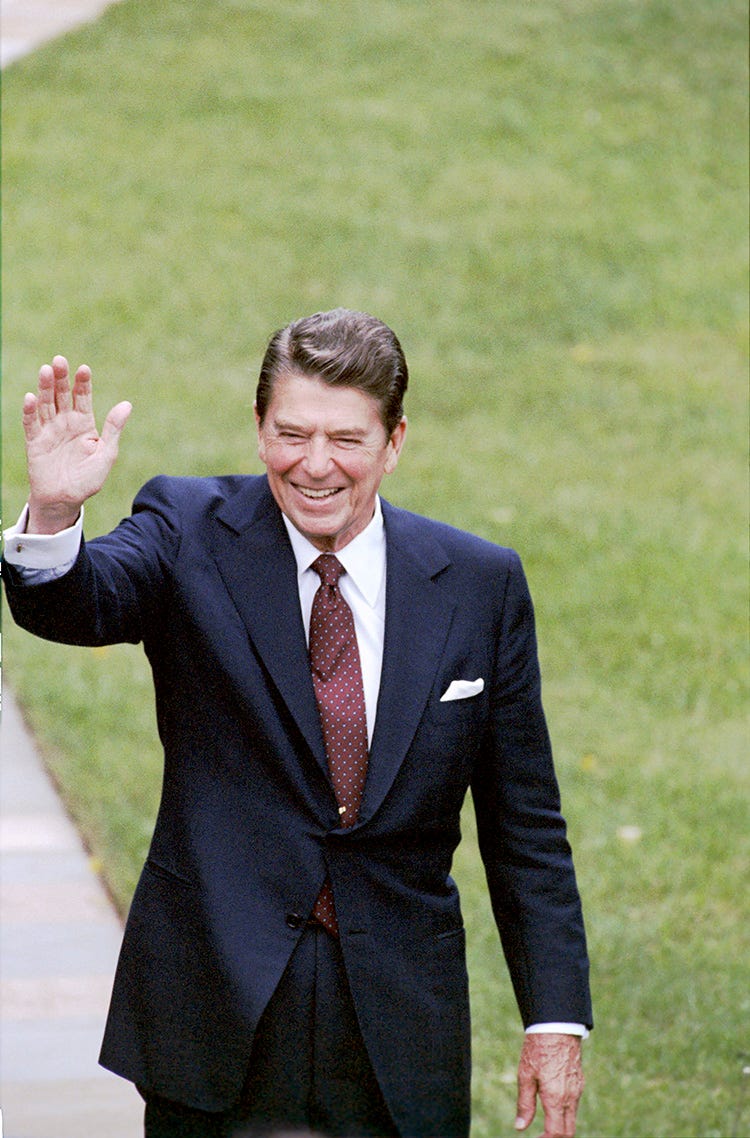Reagan Derangement Syndrome Haunts the Left
“Decline of Reaganism”? Not so fast
An above-the-fold, front-page article by David Leonhardt in today’s New York Times reports what the paper calls “the decline of Reaganism.”
Not so fast. Reports of the death of Reaganism are greatly exaggerated.
As evidence for his claim of “decline” of Reaganism, Leonhardt declares that, “Unlike the Reaganites, Trump criticized free trade and praised government programs like Medicare.” Yet the reality is that as president, Reagan imposed so many tariffs—on Japanese motorcycles to protect Harley-Davidson, on Japanese computers, television sets and power tools— that Milton Friedman said the Reagan administration had been “making Smoot-Hawley look positively benign.” Nor, as president, did Reagan repeal Medicare or Social Security, or make doing so at all a priority.
Meanwhile, elsewhere on the Times front page is a report on a “new Star Wars plan” for space-based weapons, a new twist on a signature Reagan policy initiative. Also meanwhile, the Saturday Wall Street Journal carries an interview with Speaker of the House Mike Johnson, who other than Trump is the Republican Party’s most significant figure at the moment, and who regularly invokes Reagan in making his own case for American international leadership. “I think isolationism is a dangerous thing,” he tells the Journal. “Ronald Reagan used to say that the leadership of the free world was placed upon the shoulders of the United States after World War II, and a strong America is good for the whole world—that’s how I paraphrase it.”
The Times is still blaming Reagan for things that aren’t even his fault. In a negative review by Laura Kipnis of the book “Morning After the Revolution,” by Nellie Bowles, the Times writes, “When inequality rises, so does homelessness, which seems unfair to pin on progressives. Nor were they the ones who decided that deinstitutionalizing the mentally ill was a great idea. That would be Ronald Reagan.”
The idea that deinstitutionalizing the mentally ill was all Ronald Reagan’s fault is insane, or at the very least delusional in terms of its detachment from historical reality. Other contributors include the 1962 book “One Flew Over the Cuckoo’s Nest” by counterculture figure and LSD advocate Ken Kesey, who had worked as a nurse at a psychiatric hospital. President Kennedy sent a message to Congress on the topic in 1963 declaring “obsolete” the approach of “a prolonged or permanent confinement in huge, unhappy mental hospitals where they were out of sight and forgotten.” Congress responded with the Community Mental Health Act of 1963, which Kennedy signed into law. As Senator Moynihan pointed out in a 1989 letter to the editor of the New York Times, if Kennedy had known the hospitals would be emptied out and the streets “filled with homeless, deranged people” because not enough community health centers would be built, Kennedy might put his pen down instead of signing the law. In parallel there were a series of legal developments in federal courts, including the Wyatt v. Stickney and Wyatt v. Aderholt cases in Alabama and the Willowbrook case in New York State Association of Retarded Children v. Rockefeller and New York State Association of Retarded Children v. Carey. Lots of the litigation was advanced by the American Civil Liberties Union, the New York Civil Liberties Union, or other groups, such as what is now known as the Bazelon Center for Mental Health Law, with support from the usual suspects, such as the Ford Foundation.
Meanwhile, a former Treasury Secretary and former Harvard president, Larry Summers, in his latest social media post about the Harvard antisemitism and disruptive protest situation, observes, “It was public revulsion at what happened at Berkeley that launched Ronald Reagan’s political career.” I can’t quite tell if that’s intended to be a wake-up call to Harvard: clean up your act fast or we might be stuck with another Reagan, which to Harvard people is a scary disaster? Or a consolation: Harvard may be a disaster, but the consequence might be a conservative policy counterrevolution that yields an economic boom, the defeat of America’s worst enemy abroad, and a vast expansion of freedom and prosperity. My suspicion is that Summers knows that if there’s any chance of terrifying Harvard faculty, administrators, and governing boards into action, it’s by invoking the menace of a Reagan revival.
If the Harvard antisemitism crisis and campus unrest at Columbia and other campuses do indeed wind up producing another Reagan-like political leader, the juice might be worth the squeeze, as they say at Stanford Law School. That Ronald Wilson Reagan is still so much on the mind of so many liberals is a sign that his influence may not be fading as much as is claimed.
Thank you!: If you are a paying reader of The Editors, you are helping to maintain an accurate portrayal of Reagan’s role against voices in other publications that are distorting the record. If you aren’t yet a paying subscriber, please become one.
And if you appreciate The Editors, please help us grow by forwarding this email to people who might enjoy it, along with a suggestion that they sign up.




Among its many crimes, the current deranged left's mangling of the nation's past is truly extraordinary, especially given the way it lectures us all constantly about who is or is not "on the right side of history." This excellent summary of the actual origins of deinstitutionalization makes the left's astounding ignorance of even its own history clear. I guess you could say this is the New York Times 1619-izing of the Reagan presidency.
The last great statesman President we had. I miss those years. We need another Reagan.